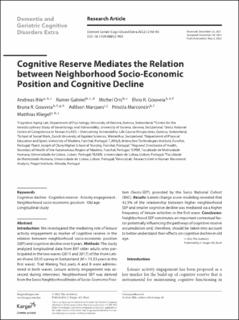Please use this identifier to cite or link to this item:
https://doi.org/10.21256/zhaw-24954Full metadata record
| DC Field | Value | Language |
|---|---|---|
| dc.contributor.author | Ihle, Andreas | - |
| dc.contributor.author | Gabriel, Rainer | - |
| dc.contributor.author | Oris, Michel | - |
| dc.contributor.author | Gouveia, Élvio R. | - |
| dc.contributor.author | Gouveia, Bruna R. | - |
| dc.contributor.author | Marques, Adilson | - |
| dc.contributor.author | Marconcin, Priscila | - |
| dc.contributor.author | Kliegel, Matthias | - |
| dc.date.accessioned | 2022-05-12T11:19:58Z | - |
| dc.date.available | 2022-05-12T11:19:58Z | - |
| dc.date.issued | 2022 | - |
| dc.identifier.issn | 1664-5464 | de_CH |
| dc.identifier.uri | https://digitalcollection.zhaw.ch/handle/11475/24954 | - |
| dc.description.abstract | Introduction: We investigated the mediating role of leisure activity engagement as marker of cognitive reserve in the relation between neighborhood socio-economic position (SEP) and cognitive decline over 6 years. Methods: The study analyzed longitudinal data from 897 older adults who participated in the two waves (2011 and 2017) of the Vivre-Leben-Vivere (VLV) survey in Switzerland (M = 74.33 years in the first wave). Trail Making Test parts A and B were administered in both waves. Leisure activity engagement was assessed during interviews. Neighborhood SEP was derived from the Swiss Neighborhood Index of Socio-Economic Position (Swiss-SEP), provided by the Swiss National Cohort (SNC). Results: Latent change score modeling revealed that 42.5% of the relationship between higher neighborhood SEP and smaller cognitive decline was mediated via a higher frequency of leisure activities in the first wave. Conclusion: Neighborhood SEP constitutes an important contextual factor potentially influencing the pathways of cognitive reserve accumulation and, therefore, should be taken into account to better understand their effects on cognitive decline in old age. | de_CH |
| dc.language.iso | en | de_CH |
| dc.publisher | Karger | de_CH |
| dc.relation.ispartof | Dementia and Geriatric Cognitive Disorders Extra | de_CH |
| dc.rights | https://creativecommons.org/licenses/by-nc/4.0/ | de_CH |
| dc.subject | Cognitive decline | de_CH |
| dc.subject | Cognitive reserve | de_CH |
| dc.subject | Activity engagement | de_CH |
| dc.subject | Neighborhood socio-economic position | de_CH |
| dc.subject | Old age | de_CH |
| dc.subject | Longitudinal study | de_CH |
| dc.subject.ddc | 305: Personengruppen (Alter, Herkunft, Geschlecht, Einkommen) | de_CH |
| dc.subject.ddc | 307: Gemeinschaften | de_CH |
| dc.title | Cognitive reserve mediates the relation between neighborhood socio-economic position and cognitive decline | de_CH |
| dc.type | Beitrag in wissenschaftlicher Zeitschrift | de_CH |
| dcterms.type | Text | de_CH |
| zhaw.departement | Soziale Arbeit | de_CH |
| zhaw.organisationalunit | Institut für Vielfalt und gesellschaftliche Teilhabe (IVGT) | de_CH |
| dc.identifier.doi | 10.1159/000521905 | de_CH |
| dc.identifier.doi | 10.21256/zhaw-24954 | - |
| zhaw.funding.eu | No | de_CH |
| zhaw.issue | 2 | de_CH |
| zhaw.originated.zhaw | Yes | de_CH |
| zhaw.pages.end | 93 | de_CH |
| zhaw.pages.start | 90 | de_CH |
| zhaw.publication.status | publishedVersion | de_CH |
| zhaw.volume | 12 | de_CH |
| zhaw.publication.review | Peer review (Publikation) | de_CH |
| zhaw.funding.snf | 185901 | de_CH |
| zhaw.webfeed | Angewandte Gerontologie | de_CH |
| zhaw.webfeed | Soziale Gerontologie | de_CH |
| zhaw.author.additional | No | de_CH |
| zhaw.display.portrait | Yes | de_CH |
| Appears in collections: | Publikationen Soziale Arbeit | |
Files in This Item:
| File | Description | Size | Format | |
|---|---|---|---|---|
| 2022_Ihle-etal_Cognitive-reserve.pdf | 264.15 kB | Adobe PDF |  View/Open |
Show simple item record
Ihle, A., Gabriel, R., Oris, M., Gouveia, É. R., Gouveia, B. R., Marques, A., Marconcin, P., & Kliegel, M. (2022). Cognitive reserve mediates the relation between neighborhood socio-economic position and cognitive decline. Dementia and Geriatric Cognitive Disorders Extra, 12(2), 90–93. https://doi.org/10.1159/000521905
Ihle, A. et al. (2022) ‘Cognitive reserve mediates the relation between neighborhood socio-economic position and cognitive decline’, Dementia and Geriatric Cognitive Disorders Extra, 12(2), pp. 90–93. Available at: https://doi.org/10.1159/000521905.
A. Ihle et al., “Cognitive reserve mediates the relation between neighborhood socio-economic position and cognitive decline,” Dementia and Geriatric Cognitive Disorders Extra, vol. 12, no. 2, pp. 90–93, 2022, doi: 10.1159/000521905.
IHLE, Andreas, Rainer GABRIEL, Michel ORIS, Élvio R. GOUVEIA, Bruna R. GOUVEIA, Adilson MARQUES, Priscila MARCONCIN und Matthias KLIEGEL, 2022. Cognitive reserve mediates the relation between neighborhood socio-economic position and cognitive decline. Dementia and Geriatric Cognitive Disorders Extra. 2022. Bd. 12, Nr. 2, S. 90–93. DOI 10.1159/000521905
Ihle, Andreas, Rainer Gabriel, Michel Oris, Élvio R. Gouveia, Bruna R. Gouveia, Adilson Marques, Priscila Marconcin, and Matthias Kliegel. 2022. “Cognitive Reserve Mediates the Relation between Neighborhood Socio-Economic Position and Cognitive Decline.” Dementia and Geriatric Cognitive Disorders Extra 12 (2): 90–93. https://doi.org/10.1159/000521905.
Ihle, Andreas, et al. “Cognitive Reserve Mediates the Relation between Neighborhood Socio-Economic Position and Cognitive Decline.” Dementia and Geriatric Cognitive Disorders Extra, vol. 12, no. 2, 2022, pp. 90–93, https://doi.org/10.1159/000521905.
Items in DSpace are protected by copyright, with all rights reserved, unless otherwise indicated.